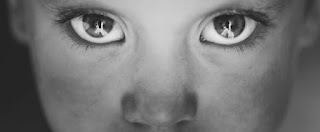"Staring into someone’s eyes for 10 minutes induces an altered state of consciousness
Volunteers ended up hallucinating and saw deformed facial traits and monsters.
http://www.sciencealert.com/staring-into-someone-s-eyes-for-10-minutes-induces-an-altered-state-of-consciousness
A psychologist in Italy has figured out how to induce a drug-free altered state of consciousness by asking 20 volunteers to sit and stare into each other’s eyes for 10 minutes straight in a dimly lit room. Not only did the deceptively simple task bring on strange ‘out of body’ experiences for the volunteers, it also caused them to see hallucinations of monsters, their relatives, and themselves in their partner’s face.
The experiment, run by Giovanni Caputo from the University of Urbino, involved having 20 young adult (15 of which were women) pair off, sit in a dimly lit room 1 metre away from each other, and stare into their partner’s eyes for 10 minutes. The lighting in the room was bright enough for the volunteers to easily make out the facial features of their partner, but low enough to diminish their overall colour perception.
A control group of 20 more volunteers were asked to sit and stare for 10 minutes in another dimly lit room in pairs, but their chairs were facing a blank wall. The volunteers were told very little about the purpose of the study, only that it had to do with a "meditative experience with eyes open".
Once the 10 minutes were up, the volunteers were asked to complete questionnaires related to what they experienced during and after the experiment. One questionnaire focussed on any dissociative symptoms that the volunteers might have experienced, and another questioned them on what they saw in their partner’s face (eye-staring group) or their own face (control group).
Dissociation is a term used in psychology to describe a whole range of psychological experiences that make a person feel detached from their immediate surroundings. Symptoms such as a loss of memory, seeing everything in distorted colours, or feeling like the world isn’t real can be brought on by abuse and trauma; drugs such as ketamine, alcohol, and LSD; and now, apparently, face-staring.
"The participants in the eye-staring group said they'd had a compelling experience unlike anything they'd felt before," Christian Jarrett writes for the British Psychological Society’s Research Digest.
Reporting in journal Psychiatry Research, Caputo says the eye-staring group out-scored the control group in all the questionnaires, signifying that something about staring into another human being’s eyes for 10 uninterrupted minutes had had a profound effect on their visual perception and mental state. "
Volunteers ended up hallucinating and saw deformed facial traits and monsters.
http://www.sciencealert.com/staring-into-someone-s-eyes-for-10-minutes-induces-an-altered-state-of-consciousness
A psychologist in Italy has figured out how to induce a drug-free altered state of consciousness by asking 20 volunteers to sit and stare into each other’s eyes for 10 minutes straight in a dimly lit room. Not only did the deceptively simple task bring on strange ‘out of body’ experiences for the volunteers, it also caused them to see hallucinations of monsters, their relatives, and themselves in their partner’s face.
The experiment, run by Giovanni Caputo from the University of Urbino, involved having 20 young adult (15 of which were women) pair off, sit in a dimly lit room 1 metre away from each other, and stare into their partner’s eyes for 10 minutes. The lighting in the room was bright enough for the volunteers to easily make out the facial features of their partner, but low enough to diminish their overall colour perception.
A control group of 20 more volunteers were asked to sit and stare for 10 minutes in another dimly lit room in pairs, but their chairs were facing a blank wall. The volunteers were told very little about the purpose of the study, only that it had to do with a "meditative experience with eyes open".
Once the 10 minutes were up, the volunteers were asked to complete questionnaires related to what they experienced during and after the experiment. One questionnaire focussed on any dissociative symptoms that the volunteers might have experienced, and another questioned them on what they saw in their partner’s face (eye-staring group) or their own face (control group).
Dissociation is a term used in psychology to describe a whole range of psychological experiences that make a person feel detached from their immediate surroundings. Symptoms such as a loss of memory, seeing everything in distorted colours, or feeling like the world isn’t real can be brought on by abuse and trauma; drugs such as ketamine, alcohol, and LSD; and now, apparently, face-staring.
"The participants in the eye-staring group said they'd had a compelling experience unlike anything they'd felt before," Christian Jarrett writes for the British Psychological Society’s Research Digest.
Reporting in journal Psychiatry Research, Caputo says the eye-staring group out-scored the control group in all the questionnaires, signifying that something about staring into another human being’s eyes for 10 uninterrupted minutes had had a profound effect on their visual perception and mental state. "

No comments:
Post a Comment